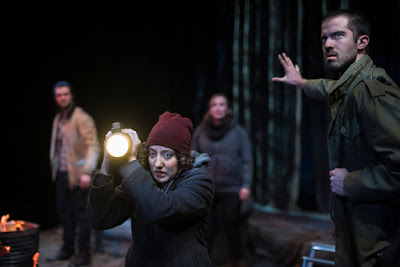As children, we have an almost instinctive belief in magic. Santa Claus, the Tooth Fairy and the Easter Bunny reign undisputed. But as we grow up, the belief of our youth wanes, whether through cynicism or well meaning adults. Seeking to rekindle that belief in the extraordinary is The Illusionists, now taking up residence at the Overture Center.
The presentation is not that of your typical magic show. Illusions are accompanied by flashing lights, drumbeats that reverberate in your chest, and dancing assistants in leather that isn’t so much protective as decorative. It’s also rare that any of the seven illusionists appear onstage together, the performance is composed more of individual tricks by individual illusionists than collaboration between performers.
That said, the execution of each trick is exquisite. Rarely is the secret evident, and in most cases, the end result is enough to keep the audience from hypothesizing. Particularly notable in this regard is Kevin James’s The Inventor, charming the audience with illusions that bring back the nostalgia of childhood.
On the other end of the spectrum is Dan Sperry’s Anti-Conjuror, a vulgar rocker with long hair and white face paint. Sperry’s barely veiled sexual innuendo keeps the adults entertained and the children mystified. That isn’t to say that he is less talented than the others. At one point in the show, he performs a run of captivating sleight of hand tricks that goes for at least five minutes, all while completely silent.
However, the question of whether or not this performance is appropriate for children still remains. Although the ticket states that children under six cannot be admitted, I have to wonder if that’s entirely accurate. The sexual nature of a few of the characters (Sperry and Jeff Hobson’s Trickster) not to mention a number of violent illusions suggest a more stringent rating. The assistants, dressed in leather that reveals much more than it conceals, are another concern.
But regardless of whether or not it’s appropriate for children, The Illusionists provides an updated take on magic that is much darker than its origins. Gone are the genial men in tails and a top hat, transforming rabbits with a wave of their white tipped wand. In their place are a group of men as varied and diverse as the world we live in today. (As much as a show that only features male illusionists can be diverse.) With its spectacle and stunning feats of deception, the Illusionists is a show that will make the adults in the room believe in magic again.



